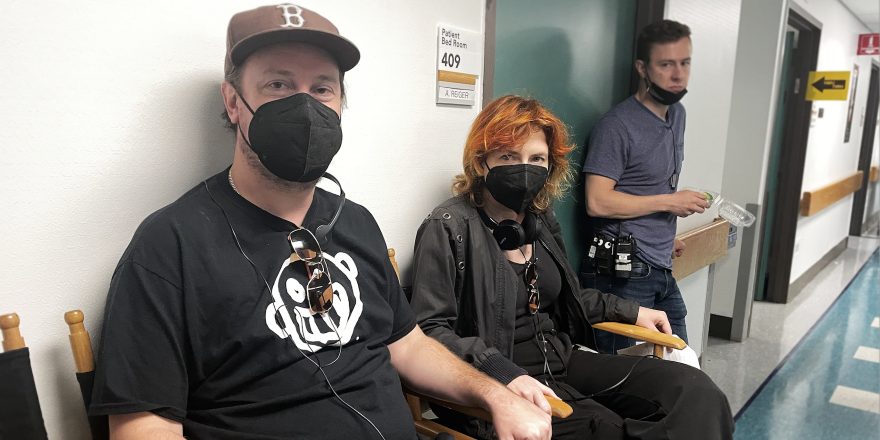“Of each particular thing, ask: what is it in itself? What is its nature?”
– Marcus Aurelius/Hannibal Lecter
When I came up with the idea for my first feature film, birth/rebirth, I was 26 years old, married, and identified as a woman. I remember saying to Brendan, my husband at the time, over dinner, “What do you think a female Victor Frankenstein would look like? Someone who wanted to create life with her mind – but was forced to gestate the materials for her experiments with her own body?”
You know, regular married couple dinner table-type talk.
As we knocked around the premise, the conversation turned to my discomfort with the idea of hosting a fetus in my womb, and Brendan almost immediately shut down. I had inadvertently touched a third rail in our relationship.
You see, Brendan and I had met as teens and gotten married in our early 20s, and though we had the very adult titles of husband and wife, large parts of ourselves were very much still forming. (I, for example, was realizing I hated most things about the idea of being a “wife,” but more on that later.)

Early on in our marriage, I had the revelation that I didn’t want to have a baby with my body. It’s not that I didn’t want children – as the oldest of four, procreating in some form felt like an inevitability. I just didn’t want to do it with my uterus.
When I raised the idea of adoption, Brendan seemed confused, as if I were suggesting we start a family in an Amish community, or on the moon. Brendan’s idea of family, which was rooted in biology and ideas of shared culture and ancestry, felt equally alien to me.
And so, the end of our marriage began.
Not because of that single issue, but because of our intransigence around it. It was our need for the terms of our relationship to be fixed that ultimately destroyed it. We couldn’t figure out how to reach our shared goal, our fabled “happy ending,” without compromising what we thought of as the fundamental building blocks of our imagined futures.
Four years on, I was in film school, newly divorced and just beginning to learn about the concept of gender fluidity. (“How cool,” I thought. “I wish that had been accessible to me when I was younger,” I thought. “It’s a shame my identity is fixed because I missed the boat and I’m too old.” More on this later.)

I was in the middle of throwing a temper tantrum, trying to disown my pre-thesis film because it hadn’t turned out the way I envisioned and a very famous director had eviscerated it in a master class, likening it to a “Nickelodeon after-school special.”
Another, kinder mentor begged me to look at the footage with fresh eyes and push through. She said to me: “Don’t murder your baby because its eyes are the wrong color.” And even though I thought this was an unforgettable phrase, I had no idea what it meant. It took me years to realize she was talking about letting go of perfectionism. About examining, as Marcus Aurelius would say, the nature of the thing in front of me, and guiding it into becoming the best version of itself, rather than trying to change it fundamentally.
In my mid-thirties, I was still putting off the idea of having children, though I still figured I’d do it, one way or another. I’d decided not to think about parenthood until after I made my first feature, something few people ever get the opportunity to do. [Spoiler alert: I shot said first feature at age 40, and it’s a horror movie about childbirth.] In the intervening years, Brendan and I had gotten back together, split up, and done it all again countless times, reopening old wounds in the process. The thing that ultimately interrupted this cycle was the sideways realization that while we were disastrous as a romantic couple, we were extraordinarily compatible as writing partners.
We started working on several features together, including my old Frankenstein idea, as well as a mountain of shorts. As we poured our hearts and souls into characters, we began to reveal ourselves to each other in ways we were never able to when we were married. When I came out to Brendan as non-binary – something I would have been terrified to do 10 years prior – his first, completely genuine, reaction was, “That makes so much sense!”

We did end up making babies, in film form; Frankenstein babies, to be sure. Partially him and partially me, and we love each of them because they hold all of our flaws as well as our best qualities. Something we’ve come to, together, is a commitment to process in our work and our relationships. We now have a willingness to start down a path without a pathological need to predict where it is going. We can listen to each other and celebrate one another’s differences, even if we don’t always understand them. Our story doesn’t exactly have a happy ending; it doesn’t have an ending at all. It will go on and evolve and mutate until one of us is dead.
Or, as Marcus Aurelius might put it, “Time is like a river, made up of passing events, and a violent stream; for as soon as a thing has been seen, it is swept by, and another comes in its place, and this too will be swept away.”
*Written with a great deal of input from Brendan J. O’Brien.
Featured image shows Brendan J. O’Brien and Laura Moss on the set of birth/rebirth; image by Chananun Chotrungroj, courtesy Laura Moss.








